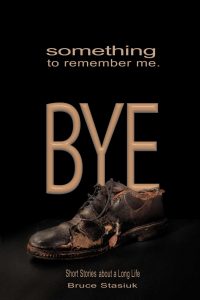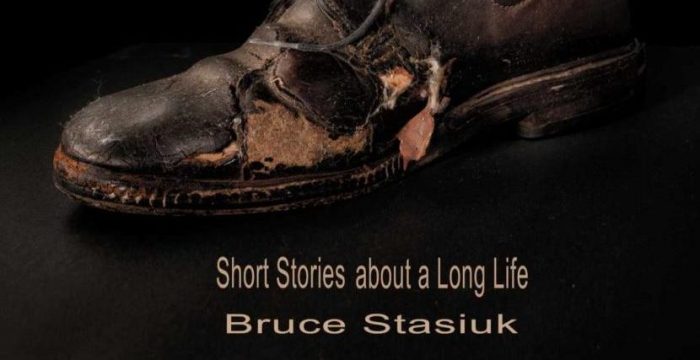Book Review: Something to Remember Me. BYE
Reviewed by Jeffrey Sanzel

Everything you need to know is on the copyright page: “Maybe some of the names have been changed to protect the identities of certain characters. Maybe not.” The “Non-Dedication” follows.
This book defies categorization. It almost—but not quite—defies description.
With Something to Remember Me. BYE, Bruce Stasiuk has created a work that is edgy, raw, and darkly comic. There is not a word wasted; the writing produces chills because it is, quite simply, brilliant.
Subtitled “Short Stories about a Long Life,” the over three dozen interconnected pieces find extraordinary depth in even the most everyday topics. His stark prose captures a deeper essence. The stories could be read individually—or perhaps randomly—but the underlying structure gives strength to the whole. And while they are not chronological, the order possesses an indescribable logic.
The book is a memoir—of a sort. It is also a collage, a reflection, and many more things all at once. As a young man, Stasiuk was a first-rate athlete: stickball, baseball, diving, and basketball. He covers them with a keen eye. Girls are discussed in almost pastoral terms. And yet, Stasiuk makes everything “other” and somehow “more than.”

At age seventeen, a devastating trampoline accident changed his life’s trajectory. A long recovery set him on a different path, eventually becoming a teacher. Yet, he is never self-pitying, whether describing the hospital, the rehab, and the many losses that ensued. He has not overcome challenges; he has transformed them. Somehow, his struggles manage to be simultaneously germane and tangential. It is never less than personal and self-revelatory, and yet there is unique and contradictory objectivity that only enriches his account.
“The war ended and new customers were marching home, toting duffle bags over their shoulders, and the Spanish flu in their lungs.” Few authors possess the art and the skill to be both simple and unnerving in the same sentence. Stasiuk possesses a remarkable elegance: “Marie buried her daughter and took her grandchild in.” The synthesis of the rhythmically poetic and the prosaic reality weaves throughout the slender volume.
Succinctness is not just a strength but a gift. In “The Apology,” a picturesque father-son venture to a baseball game builds to a coda, both sad and inspiring. Stasiuk’s family exists within the pages as painted shadows, hovering around the edges, peeking in, sometimes coming into bright focus, but then receding.
One of the finest pieces is “Uncle Jack”:
He spoke fast, compressing conversations, rarely offering the courtesy of a comma. As he flooded the air with words, his eyes scanned the room like an oscillating fan, hunting for a larger audience. Uncle Jack was always trolling to see who wasn’t listening. Since the adults weren’t, he aimed for us, his nieces and nephews; little pairs of ears to be filled.
In a trip to Provincetown, his ruminations on seemingly absolute truths of childhood are revealed to be anything but. He offers nostalgia laced with tension. In “Knuckles,” whimsy and death go hand-in-hand in astonishing ways. The book is rich in dark humor. The final sentences of “Consanguinity” are hilarious and epiphanous. He refers to his colonoscopy as “the age of the medical scavenger hunt.”
In describing his second career, he states: “Nothing spectacular. Nothing extraordinary. No heroics.” The self-effacing statement resonates throughout the entire book. He never touts his accomplishments; he presents them.
He poses the rare direct messages with eloquence and subtlety. The thoughts, ideas, and musings sneak up, land, and then quickly retreat. His one nod towards commentary references the assistance he received: “Sometimes, if the government invests in a person, especially one trapped in a difficult spot, it might be the best investment the government could ever make.”
The report of a close friend, remembered on his death, is not a hagiography but a detailed and heartfelt portrait. A celebrity encounter. An autopsy. Nothing is arbitrary, with seemingly candid narratives turned into almost twisted parables. The piece titled “The Happy Ending” is subtitled, “This is a true story up to the point where it is not.” In some ways, this is the perfect bookend to the copyright page.
Sometimes a piece of writing defies description. Something to Remember Me. BYE does not ask or beg to be read. Instead, it demands to be experienced. And shared. Such is the case with Bruce Stasiuk’s book. Purchase. Read. Repeat.
A resident of Setauket, author Bruce Stasiuk presently teaches a workshop at Stony Brook University’s OLLI program. Something to Remember Me. BYE: Short Stories about a Long Life is available through the publisher, bookbaby.com, Book Revue in Huntington, Barnes and Noble and Amazon.







